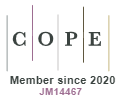THEMES AND METHODS IN SUSTAINABILITY RESEARCH
DOI:
https://doi.org/10.5585/geas.v8i3.15731Keywords:
Bibliometrics, Sustainability, Co-citation, Bibliographic coupling.Abstract
The aim of the study was to identify emergent themes and utilized methods in sustainability research. The study was a bibliometric study with co-citation and bibliographic coupling analysis. The sample is comprised of 1,292 articles published in all the peer-reviewed Scopus business journals, between 1999 and 2018. The study differentiates from traditional bibliometric analyses, by scrutinizing not only theorist themes but also the employed methods. The co-citation analysis highlights three major themes that guide sustainability research: (1) Sustainable Supply Chain Management; (2) Corporate Social Responsibility; and (3) Sustainable Tourism. The bibliographic coupling analysis shows five major current research themes: (1) Sustainable Classic Supply Chain Structures; (2) Global and Emerging Economies Sustainable Supply Chain; (3) Selection of suppliers and fuzzy techniques; (4) New Sustainable Supply Chain Structures; and (5) Environmental Responsibility. Sustainability research appears in several areas of knowledge and presents a variety of methods without showing an inclination towards qualitative or quantitative approach. This results in more unified and sedimented themes that are primarily constituted by quantitative studies, and more diverse themes, emerging or dealing with difficult to measure phenomena that are addressed qualitatively. The theme of sustainability management is on the rise, which generates a positive expectation on the expansion of research over the coming years. However, we identified the absence of important themes related to green technologies, sustainable innovations and public policy.
Downloads
References
Acedo, F. J., Barroso, C., & Galan, J. L. (2006). The resource-based theory: dissemination and main trends. Strategic Management Journal, 27(7), 621-636. doi: 10.1002/smj.532
Blei, D. M. (2012). Probabilistic topic models. Communications of the ACM, 55(4), 77-84.
Broadus, R. N. (1987). Towards a definition of “bibliometrics”. Scientometrics, 12(5-6), 373-379. Doi: 10.1007/BF02016680
Culnan, M. J., O’Reilly, C. A., III, & Chatman, J. A. (1990). Intellectual structure of research in organizational behavior, 1972-1984: a co-citation analysis. Journal of the American Society for Information Science, 41(6), 453-458. doi: 10.1002/(SICI)1097-4571(199009)41:6<453::AIDASI13>3.0.CO;2-E
Furrer, O., Tomas, H., & Goussevskaia, A. (2008). The structure and evolution of the strategic management field: a content analysis of 26 years of strategic management research. International Journal of Management Reviews, 10(1), 1-23. doi: 10.1111/j.1468-2370.2007.00217.x
Ferreira, M. (2011). A bibliometric study on Ghoshal’s managing across borders. Multinational Business Review, 19(4), 357-375.
Glänzel, W., & Thijs, B. (2012). Using ‘‘core documents’’ for detecting and labelling new emerging topics. Scientometrics, 91(2), 399-416. doi:10.1007/s11192-011-0591-7
Hair, J. F., Black, W. C., Babin, B. J., Anderson, R. E., & Tatham, R. L. (2009). Análise multivariada de dados. São Paulo: Bookman Editora.
Leydesdorff, L. (1987). Various methods for the mapping of science. Scientometrics, 11(5), 295-324. doi: 10.1007/BF02279351
McCain, K. W. (1986). Cocited author mapping as a valid representation of intellectual structure. Journal of the American Society for Information Science, 37(3), 111-122. doi: 10.1002/(SICI)1097-4571(198605)37:3<111::AID-ASI2>3.0.CO;2-D
McCain, K. W. (1990). Mapping authors in intellectual space: a technical overview. Journal of the American Society for Information Science, 41(6), 433-443. doi: 10.1002/(SICI)1097-4571(199009)41:6<433::AID-ASI11>3.0.CO;2-Q
McCain, K. W. (1991). Mapping economics through the journal literature: an experiment in journal cocitation. Journal of the American Society for Information Science, 42(4), 290-296. doi: 10.1002/(SICI)1097-4571(199105)42:4<290::AID-ASI5>3.0.CO;2-9
Nerur, S. P., Rasheed, A. A., & Natarajan, V. (2008). The intellectual structure of the strategic management field: An author co‐citation analysis. Strategic Management Journal, 29(3), 319-336.
Phelan, S. E., Ferreira, M. P., & Salvador, R. (2002). The first twenty years of the Strategic Management Journal. Strategic Management Journal, 23(12), 1161-1168. doi: 10.1002/smj.268
Pritchard, A. (1969). Statistical bibliography or bibliometrics? Journal of Documentation, 25(4), 348-349.
Quevedo-Silva, F., Santos, E. B. A., Brandão, M. M., & Vils, L. (2016). Estudo bibliométrico: orientações sobre sua aplicação. REMark, 15(2), 246-255.
Ramos-Rodríguez, A.-R., & Ruíz-Navarro, J. (2004). Changes in the intellectual structure of strategic management research: a bibliometric study of the Strategic Management Journal, 1980–2000. Strategic Management Journal, 25(10), 981-1004. doi: 10.1002/smj.397
Randall, D. M., & Gibson, A. M. (1990). Methodology in business ethics research: A review and critical assessment. Journal of business ethics, 9(6), 457-471.
Schildt, H. A., Zahra, S. A., & Silanpää, A. (2006). Scholarly communities in entrepreneurship research: a co-citation analysis. Entrepreneurship Theory & Practice, 30(3), 399-415. doi: 10.1111/j.1540-6520.2006.00126.x
Serra, F. A. R., Ferreira, M. P., de Camargo Guerrazzi, L. A., & Scaciotta, V. V. (2018). Doing Bibliometric Reviews for the Iberoamerican Journal of Strategic Management. Iberoamerican Journal of Strategic Management (IJSM), 17(3), 01-16
Shafique, M. (2013). Thinking inside the box? Intellectual structure of the knowledge base of innovation research (1988–2008). Strategic Management Journal, 34(1), 62-93. doi: 10.1002/smj.2002
Shane, S. (1997). Who is publishing the entrepreneurship research?, Journal of Management, 23(1), 83-95. doi: 10.1177/014920639702300105
Small, H. (1973). Co‐citation in the scientific literature: a new measure of the relationship between two documents. Journal of the American Society for information Science, 24(4), 265-269. doi: 10.1002/asi.4630240406
Small, H., & Garfield, E. (1993). Co-citation analysis of science: henry small on mapping the collective mind of science. Current Comments, (19), 3-13.
Souza, Maria Tereza Saraiva de, & Ribeiro, Henrique César Melo. (2013). Sustentabilidade ambiental: uma meta-análise da produção brasileira em periódicos de administração. Revista de Administração Contemporânea, 17(3), 368-396. https://dx.doi.org/10.1590/S1415-65552013000300007
Subramanyam, K. (1983). Bibliometric studies of research collaboration: a review. Journal of Information Science, 6(1), 33-38. doi: 10.1177/016555158300600105
White, H. D., & McCain, K. W. (1998). Visualizing a discipline: an author co-citation analysis of information science, 1972-1995. Journal of the American Society for Information Science, 49(4), 327-355. doi: 10.1002/(SICI)1097-4571(19980401)49:4<327::AID-ASI4>3.0.CO;2-4
Zupic, I.; Čater, T. Bibliometric Methods in Management and Organization. Organizational Research Methods, [s. l.], v. 18, n. 3, p. 429–472, 2015.
Downloads
Published
How to Cite
Issue
Section
License
Copyright (c) 2019 José Storopoli, Heidy Ramos, Giseli Quirino, Carlos Rufín

This work is licensed under a Creative Commons Attribution-NonCommercial-ShareAlike 4.0 International License.
- Abstract 1670
- PDF 849












